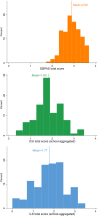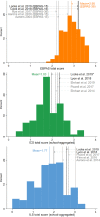Individual and organizational factors as predictors of early evidence-based practice adoption in Michigan high schools: Baseline data from an implementation trial
- PMID: 37091540
- PMCID: PMC10052498
- DOI: 10.1177/26334895231159429
Individual and organizational factors as predictors of early evidence-based practice adoption in Michigan high schools: Baseline data from an implementation trial
Abstract
Background: Adolescents increasingly access mental health services in schools. School mental health professionals (SPs; school counselors, social workers, etc.) can offer evidence-based mental health practices (EBPs) in schools, which may address access gaps and improve clinical outcomes. Although some studies have assessed factors associated with EBP adoption in schools, additional research focusing on SP- and school-level factors is warranted to support EBP implementation as SPs' mental health delivery grows.
Methods: Baseline data were collected from SPs at Michigan high schools participating in a statewide trial to implement SP-delivered cognitive behavioral therapy (CBT) to students. Models examined factors associated with attitudes about EBPs, implementation climate, and implementation leadership, and their associations with CBT knowledge, training attendance, and pre-training CBT delivery.
Results: One hundred ninety-eight SPs at 107 schools (87%) completed a baseline survey. The mean Evidence-Based Practice Attitude Scale (EBPAS) total score was 2.9, and school-aggregated mean scores of the Implementation Climate Scale (ICS) and Implementation Leadership Scale (ILS) were 1.83 and 1.77, respectively, all on a scale ranging from 0 (low) to 4 (high). ICS and ILS scores were lower than typically reported in clinical settings, while EBPAS scores were higher. School characteristics were not significantly associated with EBPAS, ICS, or ILS scores, but scores did differ by SP role. Higher EBPAS scores were associated with more CBT knowledge (average marginal effect for 1 SD change [AME] = 0.15 points) and a higher probability of training completion (AME = 8 percentage points). Higher ICS scores were associated with a higher probability of pre-training CBT delivery (AME = 6 percentage points), and higher ILS scores were associated with higher probability of training completion (AME = 10 percentage points).
Conclusions: Our findings suggest that SPs' attitudes toward EBPs and organizational support were positively associated with early signs of implementation success. As schools increasingly fill the adolescent mental healthcare access gap, efforts to strengthen both provider attitudes toward EBP and strategic organizational factors supporting EBP delivery will be key to encouraging EBP uptake in schools.
Plain language summary: Schools are an important setting in which adolescents receive mental healthcare. We need to better understand how to implement evidence-based practices (EBPs) in this setting to improve student mental health. This study examined the attitudes and perceptions of school professionals (SPs) as key contributors to the implementation of a particular EBP, the delivery of cognitive behavioral therapy (CBT) in schools. The study found that implementation climate and leadership scores in participating schools were lower than scores typically reported in clinical settings, while scores for SP attitudes about EBP adoption were higher than typical scores in clinical settings. Results further suggest that SPs with more positive attitudes toward EBPs are more knowledgeable of CBT and more likely to complete a 1-day CBT training. We also found that higher implementation climate scores were associated with SPs reporting pre-training CBT delivery (although this association was not statistically significant), and more implementation leadership was associated with SPs completing the CBT training. These findings suggest that SP attitudes toward EBPs and organizational support in schools are positively associated with early signs of implementation success. Early, low-intensity efforts to (1) improve SP attitudes about mental health EBPs, and (2) increase schools' support for implementation may scaffold more intensive implementation efforts in schools down the road.
Keywords: CBT; EBPAS; ICS; ILS; evidence-based practice; mental health; schools.
© The Author(s) 2023.
Conflict of interest statement
The authors declared no potential conflicts of interest with respect to the research, authorship, and/or publication of this article.
Figures







Similar articles
-
Adaptive School-based Implementation of CBT (ASIC): clustered-SMART for building an optimized adaptive implementation intervention to improve uptake of mental health interventions in schools.Implement Sci. 2018 Sep 5;13(1):119. doi: 10.1186/s13012-018-0808-8. Implement Sci. 2018. PMID: 30185192 Free PMC article. Clinical Trial.
-
Teacher attitudes toward evidence-based practices: Exploratory and confirmatory analyses of the school-adapted evidence-based practice attitude scale.Implement Res Pract. 2023 Jan 17;4:26334895221151026. doi: 10.1177/26334895221151026. eCollection 2023 Jan-Dec. Implement Res Pract. 2023. PMID: 37091537 Free PMC article.
-
Individual and organizational factors that affect implementation of evidence-based practices for children with autism in public schools: a cross-sectional observational study.Implement Sci. 2019 Mar 13;14(1):29. doi: 10.1186/s13012-019-0877-3. Implement Sci. 2019. PMID: 30866976 Free PMC article.
-
Provider attitudes toward evidence-based practice in autism: a mini-review.Front Child Adolesc Psychiatry. 2024 May 2;3:1363532. doi: 10.3389/frcha.2024.1363532. eCollection 2024. Front Child Adolesc Psychiatry. 2024. PMID: 39816585 Free PMC article. Review.
-
Evaluation of Implementation Strategies for Cognitive Behavioral Therapy (CBT), Acceptance and Commitment Therapy (ACT), and Mindfulness-Based Stress Reduction (MBSR): a Systematic Review.J Gen Intern Med. 2023 Sep;38(12):2782-2791. doi: 10.1007/s11606-023-08140-4. Epub 2023 Apr 3. J Gen Intern Med. 2023. PMID: 37012538 Free PMC article.
References
-
- Aarons G. A., Cafri G., Lugo L., Sawitzky A. (2012). Expanding the domains of attitudes towards evidence-based practice: The Evidence Based Practice Attitude Scale-50. Administration and Policy in Mental Health and Mental Health Services Research, 39(5), 331–340. 10.1007/s10488-010-0302-3 - DOI - PMC - PubMed
-
- Aarons G. A., Ehrhart M. G., Farahnak L. R., Hurlburt M. S. (2015). Leadership and organizational change for implementation (LOCI): A randomized mixed method pilot study of a leadership and organization development intervention for evidence-based practice implementation. Implementation Science, 10(1), Article 11. 10.1186/s13012-014-0192-y - DOI - PMC - PubMed
-
- Aarons G. A., Ehrhart M. G., Moullin J. C., Torres E. M., Green A. E. (2017). Testing the leadership and organizational change for implementation (LOCI) intervention in substance abuse treatment: A cluster randomized trial study protocol. Implementation Science, 12(1), Article 29. 10.1186/s13012-017-0562-3 - DOI - PMC - PubMed
Grants and funding
LinkOut - more resources
Full Text Sources
Research Materials
Miscellaneous
